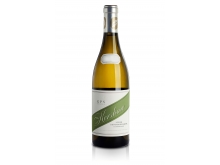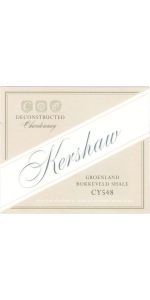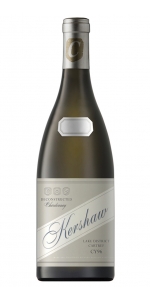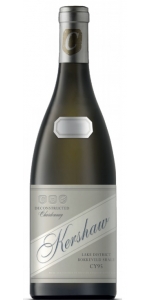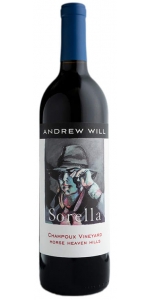Kershaw GPS Series Chard Lower Dulvenhoks 2019
6 bottles with free shipping for: $390.00
12 bottles with free shipping for: $720.00
| BUY MORE! SAVE MORE! | ||||||||||||||||||||
|
| Country: | South Africa |
| Region: | Western Cape |
| Winery: | Kershaw |
| Grape Type: | Chardonnay |
| Vintage: | 2019 |
| Bottle Size: | 750 ml |
Kershaw Chardonnay GPS Series Lower Dulvenhoks is made from 100 percent Chardonnay.
During the year, I have the opportunity to visit a number of areas outside of Elgin. Occasionally, I come across something so fascinating that it deserves a closer look.
In 2016, I discovered a small parcel of Chardonnay grapes growing on limestone soils – a rarity in the Western Cape. With limestone often touted as beneficial for Chardonnay grapes, it made sense to grasp this opportunity with both hands. The GPS Series is testament to these special places and celebrates them.
Restraint, minerality, freshness of fruit and a chiselled edge reflect limestone’s soil properties. This 2017 vintage reveals clean, bright aromas of lemon blossom, wet chalk and powdered stones. Penetrating intensity, animated acidity with a rich mid palate weight, this wine has purity of fruit (orange peel, yellow cling peaches and grapefruit peel) lemon cream biscuits and crème fraiche textures with a long finish.
Winemaking:
Grapes were hand-picked in the early morning, placed into small lug baskets and tipped directly into a press before being gently whole-bunch pressed up to a maximum of 0.6 bar or until a low juice recovery of 590 litres per ton was
obtained. The juice gravity-flowed directly to barrel (no pumps were used at all) without settling. The unclarified juice had no enzymes or yeast added to it and therefore underwent spontaneous fermentation until dry, with malolactic discouraged. The wine rested in barrel for 4 months prior to judicious sulphuring and a further 7 months’ maturation in barrel before racking, blending and bottling.
Review:
"The 2017 GPS Chardonnay has a killer bouquet, just like the 2016, the mineral-rich aromatics soaring from the glass with fantastic delineation that actually reminds me of Domaine Leflaive. The palate is well balanced with a fine bead of acidity, and a little more saline than the previous vintage, although maybe not quite as persistent. Still, this is an outstanding Chardonnay from Kershaw and it will give 12 to 15 years of drinking pleasure. - Neal Martin"
- Antonio Galloni's Vinous (November 2019), 93 pts
Surrounded by mountains, the Elgin district sits in the Western Cape of South Africa. The year-round cool climate is perfect for producing grapes with rich, subtle flavors.
Focusing on apposite noble grapes, i.e. ones with the ability to produce world-class examples, our Kershaw Elgin Chardonnay, Syrah and Pinot Noir and Kershaw Deconstructed Chardonnay and Syrah are made by South Africa’s only winemaking Master of Wine, Richard Kershaw.
Richard Kershaw Wines was established in January 2012 to create clonally selected, site-specific, cool climate wines in the Elgin Valley, South Africa’s coolest wine region. Focusing on apposite noble grapes, i.e. ones with the ability to produce world-class examples, our Kershaw Elgin Chardonnay, Syrah and Pinot Noir and Kershaw Deconstructed Chardonnay and Syrah are made by South Africa’s only winemaking Master of Wine, Richard Kershaw.
Winery Philosophy: Our commitment is to make the best wines possible from the vine clones best suited to our unique terroir. Our grapes are grown in the cool climate vineyards of Elgin in the Western Cape of South Africa. We produce only a very limited number of cases of Kershaw Elgin Chardonnay and Kershaw Elgin Syrah each vintage. Our aim always is to produce some of the best wines of their style in South Africa.
Owner: Richard Kershaw MW
Date Founded: January 2012
Born and raised in the UK, Richard travelled extensively before settling in South Africa in 1999 to make wine full time. He established Richard Kershaw Wines in January 2012 to create clonally selected, site-specific, cool climate wines in the Elgin Valley, the country’s coolest wine region, choosing to focus on apposite noble grapes (ones with the ability to produce world-class examples) and now has a stable of award-winning, much in demand wines including Kershaw Elgin Chardonnay, Syrah and Pinot Noir and Kershaw Deconstructed Chardonnay and Syrah.
One of only 10 Masters of Wine who actively make their own wines and South Africa’s only winemaking Master of Wine, Richard is much in demand when not in the vineyard or cellar. A wine show judge for many prestigious competitions around the globe, he is also part of the educational panel for the Institute of Masters of Wine, lectures for the WSET (Wine & Spirit Education Trust) in South Africa, and shares the breadth of his knowledge with students and consumers via talks, tastings and blogs.
Our grapes are grown in the cool climate vineyards of Elgin in the Western Cape of South Africa. We produce a limited number of cases of Kershaw Elgin Chardonnay, Syrah and Pinot Noir each vintage under our Clonal Selection range, and site- soil- and clone- specific Elgin Chardonnay and Syrah in our Deconstructed range. We have recently introduced our GPS Series range which explores unusual sites from outside the Elgin region, and our Smuggler's Boot range in which Richard uses a variety of winemaking techniques to produce easy drinking wines. Our aim always is to produce some of the best wines of their style in South Africa.
The Elgin Valley benefits from higher altitude, ocean proximity, specific cloud cover sequencing, high cold units and a large diurnal range, similar to Southern Burgundy and the Northern Rhône, which enables the germane grapes, Chardonnay and Syrah, to show a sense of place.
Kershaw Elgin Chardonnay makes use of the lower-yielding Dijon clones, namely 76, 95 & 96 (developed at the University of Burgundy in Dijon, France), offering a restrained, mineral style focused on elegance with a white, fruit character, some oatmeal, and complexity gained from percipient wood.
Kershaw Elgin Syrah makes use of local clones 9c and 22 giving subtlety and precision built on fine tannins that educe harmony, freshness and flavours of black fruit, iodine, medicinal notes and black pepper.
Kershaw Elgin Pinot Noir makes use of French clones PN667, PN115 and PN113 giving floral attributes underscored by purity, focus and freshness framed by fine powder tannins yet cushioned by a succulent texture and flavours of black cherry, pomegranate, rose petal and raspberry.
Each Clonal Selection wine is made from 3-4 small parcels on terroir-specific plots with particular soils types. Each Deconstructed wine is made from clone specific, soil specific site in Elgin. They are all handpicked into small lugs and vinified in Elgin travelling no more than 10-15 minutes between vineyard and cellar, avoiding unnecessary crushing and premature juice oxidation. In the cellar, they are handled minimally using a gravity-fed system that avoids pumping and no products are added to the wine.
Winemaker: Richard Kershaw MW
Kershaw Chardonnay Deconstructed Groenland Shale CY548 is made from 100 percent Chardonnay.
The inspiration for this Chardonnay stems from my belief that the Elgin region has both a signature grape as well as particular terroirs within its demarcated boundary that reflect regional credentials. This Chardonnay was selected from a sub-region of Elgin from a specific vineyard and an individual clone (CY548).
Tasting Notes:
Sourced from the foothills of the Groenland Mountain in Northern Elgin this clone has been taken from Corton Charlemagne cuttings. It produces wines that have aromatics oscillating between lemon blossom, white flowers, petrichor and struck stone. Full in body they exude concentration with white stone fruit yet reinforced with an austere texture and robustness that makes for excellent aging potential. The Bokkeveld Shales adds structure and concentration to the flavor.
Vineyards:
Sourced from the foothills of the Groenland Mountain in Northern Elgin this clone has been taken from Corton Charlemagne cuttings.
Winemaking:
Grapes were hand-picked in the early autumnal mornings, placed into small lug baskets and tipped directly into a press before being gently whole-bunch pressed up to a maximum of 0.6 bar or until a low juice recovery of 580 liters per ton was obtained. The juice gravity-flowed directly to barrel (no pumps were used at all) without settling. The unclarified juice had no enzymes or yeast added to it and therefore underwent spontaneous fermentation until dry, with malolactic discouraged. The wine rested in barrel for 4 months prior to judicious sulfuring and a further 7 months’ maturation in barrel before racking and bottling.
Barrel: Selection: A small number of artisanal coopers are selected from mostly Burgundy, with only French oak was chosen. Up to 40% of the oak is new with the remainder split into 2nd and 3rd fill barrels of predominantly 228 litres.
Look at pairing this with textured fish, straightforward chicken dishes, pan-fried or grilled pork dishes, soft-rind cheeses, cream or creamy dishes be it with pasta or the aforementioned fish, chicken or pork, to allow the complexity of the wine to shine through. If using mustard, preferably use Dijon mustard as it uses verjus (soured grape juice) and not vinegar. Also look to delicate herbs (tarragon, dill, basil, parsley) rather than hard stalked herbs (rosemary, thyme, oregano, etc). Avoid smoked meats or fish as well as highly spiced dishes as this can overwhelm the wine and clash with the oak. I would try oysters; Lobster grilled or boiled but not thermidor as it is too rich; turbot, dover sole, sea bass, yellowtail with a shellfish sauce; fish pie; roasted free-range chicken with tarragon; roast loin of pork with garlic and ginger; truffle risotto; pasta in a clam sauce; slice of brie de meaux.
Review:
"Perfume of flowers, minerals and citrus zest. The palate is dense and focused, almost chewy with an opulent mandarin mid palate and long, savory finish. Matured in 50% new oak that is seamlessly integrated with the wine."
- International Wine Review (Richard Kershaw Lifts Elgin To New Heights, February 2019), 94 pts
Kershaw Chardonnay Deconstructed Lake District Cartref CY96 is made from 100 percent Chardonnay.
Sourced from the western part of Elgin, known as the Lake District, this clone produces wines that are nervous, aromatic, elegant and sharp with slightly lower alcohol and finely balanced, the fruit profile being subtle with hints of citrus/orange peel and peach blossom and with time, some nutty elements. The Cartref soils, a mixture of decomposed granite, pebbles and quartz, adds delicacy and heightens the fruit intensity.
The inspiration for my Deconstructed Chardonnay stems from my belief that the Elgin region boasts credentials that make it world-class. To bolster these regional credentials, I have set out to prove that Elgin has both a signature grape, as well as specific ‘terroirs’ (meso-climates) that reflect intra-regional distinctions. To fully comprehend this, it is necessary to dig deeper into the DNA that make up our region. To elucidate this, I have decided to make these 3 Chardonnay wines, each selected from a specific vineyard and an individual clone. Importantly, this is an ongoing story that will unfold over the coming years.
Vintage notes:
Whilst 2017 experienced a cool winter to enable good vine dormancy, the rainfall was low and followed similar conditions felt in 2015 and 2016. Budbreak took place in ideal warm sunny conditions whilst flowering was a touch earlier than normal; strong blustery winds meant pollination took longer to complete. As a result, berry set was uneven leading to some smaller berries that despite a lower yield did have good concentration of flavours. Despite expecting an
early harvest an unusually cool December slowed down ripening whilst some January rain during veraison helped nourish the soils and more importantly, helped the vine focus on grape ripening rather than foliage & root growth. Harvest took place under blue skies in
mid-March. The net result of the drier year is that the grapes had decent natural acidity, achieved steady phenolic ripeness and plenty of intense fruit flavors.
Winemaking:
Grapes were hand-picked in the early autumnal mornings, placed into small lug baskets and tipped directly into a press before being gently whole-bunch pressed up to a maximum of 0.6 bar or until a low juice recovery of 580 litres per ton was obtained. The juice gravity-flowed directly to barrel (no pumps were used at all) without settling. The unclarified juice had no enzymes or yeast added to it and therefore underwent spontaneous fermentation until dry, with malolactic discouraged. The wine rested in barrel for 4 months prior to judicious sulphuring and a further 7 months’ maturation in barrel before racking and bottling.
Review:
"A single clone (96) grown on a single parcel from a single vineyard of Cartref soils (decomposed granite and quartz). Roasted grain, wet stones, and lemon peel aromas. Precise and tightly coiled with an intense mineral character and yellow fruit and citrus zest flavors finishing with a smoky gunflint note. Matured in 50% new oak."
- International Wine Review (Richard Kershaw Lifts Elgin To New Heights, February 2019), 93 pts
Kershaw Chardonnay Deconstructed Lake District Bokkeveld Shale CY95 is made from 100 percent Chardonnay.
The inspiration for this Chardonnay stems from my belief that the Elgin region has both a signature grape as well as particular terroirs within its demarcated boundary that reflect regional credentials. This Chardonnay was selected from a sub-region of Elgin from a specific vineyard and an individual clone.
Tasting Notes: Sourced from a parcel in the Western part of Elgin the 95 clone is known for its excellent quality creating wines that are aromatic, fuller bodied and rich yet tightly structured, well–balanced with length of flavor, managing to show restraint and mouth-watering passivity with a great line through the palate and fruit veering towards white peach flesh and nectarine. On Bokkeveld Shales it brings amplified perfume on the nose and persistence and elegance to the palate.
Winemaking:
Grapes were hand-picked in the early autumnal mornings, placed into small lug baskets and tipped directly into a press before being gently whole-bunch pressed up to a maximum of 0.6 bar or until a low juice recovery of 580 liters per ton was obtained. The juice gravity-flowed directly to barrel (no pumps were used at all) without settling. The unclarified juice had no enzymes or yeast added to it and therefore underwent spontaneous fermentation until dry, with malolactic discouraged. The wine rested in barrel for 4 months prior to judicious sulfuring and a further 7 months’ maturation in barrel before racking and bottling.
Review:
"Minerals and a hint of flint on the nose. The expressive minerality of this wine also shows on the palate with complementary light stone fruit notes. Aged in 50% new 228L oak aging for 11 months."
- International Wine Review (Richard Kershaw Lifts Elgin To New Heights, February 2019), 95 pts
Kershaw Chardonnay Deconstructed Lake District Cartref CY96 is made from 100 percent Chardonnay.
Sourced from the western part of Elgin, known as the Lake District, this clone produces wines that are nervous, aromatic, elegant and sharp with slightly lower alcohol and finely balanced, the fruit profile being subtle with hints of citrus/orange peel and peach blossom and with time, some nutty elements. The Cartref soils, a mixture of decomposed granite, pebbles and quartz, adds delicacy and heightens the fruit intensity.
The inspiration for my Deconstructed Chardonnay stems from my belief that the Elgin region boasts credentials that make it world-class. To bolster these regional credentials, I have set out to prove that Elgin has both a signature grape, as well as specific ‘terroirs' (meso-climates) that reflect intra-regional distinctions. To fully comprehend this, it is necessary to dig deeper into the DNA that make up our region. To elucidate this, I have decided to make these 3 Chardonnay wines, each selected from a specific vineyard and an individual clone. Importantly, this is an ongoing story that will unfold over the coming years.
Argot Simpatico Ranch Chardonnay is made from 100 percent Chardonnay.
Powerful aromas of key-lime, white flowers, orange blossoms and a fierce, flinty, sauvage note define a wildly complex nose. Once in the mouth, gracefully pronounced textures coat the palate delivering an exotic interpretation of cool-climate Chardonnay character — lime peel, orange blossom, ginger and clove —lingerings deep into a vibrant finish.
Planted 1978. Shallow volcanic soils on the gently-sloped, south-facing foothills of Bennett Peak on Bennett Valley’s floor. One of California’s coolest Chardonnay vineyards. In the final year of 3-year draught cycle, Simpatico Ranch saw its earliest ever harvest and smallest crop, exposing a reserve of exoticism and minerality previously untapped. A watershed vintage for both the vineyard, and appellation. Night harvested by hand on 9/16, whole-cluster pressed direct to barrel; no settling to ensure maximum lees contact. Barrel fermented on heavy lees. Malolactic fermentation. 16 months in French oak, 50% new. Finished 2 months in steel tank, low Sulphur during barrel elevage.
Review:
There are 225 cases of the 2019 Chardonnay Simpatico Ranch, which is from a cooler, higher elevation site in Sonoma. Lots of peach, tangerine, honeyed minerality, and toasted hazelnuts all emerge from the glass, and while I don't think it matches the 2018, it's a brilliant Chardonnay offering medium to full-bodied richness, nicely integrated acidity, and a great finish. It's beautifully balanced and is going to keep for at least 5-7 years."
- Jeb Dunnuck (September 2021), 94 pts
Andrew Will Winery Sorella 2019 is made from 80% Cabernet Sauvignon, 8% Merlot, 8% Cabernet Franc, 4% Petite Verdot.
Sorella means sister in Italian and was named after Chris Camarda late sister Jane Camarda. This first vintage was from 1994. This wine is made from 100% Champoux Vineyard fruit and represents the nature of the vineyard by highlighting the Cabernet Sauvignon, which is considered some of the best in Washington State. The picture on the label is a portrait of Annie Camarda (Chris’s late wife).
Review:
Flirting with triple digits, and perhaps the best Sorella yet, the 2019 Sorella explodes from the glass with a fantastic mineral essence that sways between dark red fruit tones, oak essence and freshly opened flowers. Medium to full-bodied, the wine is impeccably balanced with a silky-smooth mid-palate that bestows a stunningly beautiful wine with gobs of complexity and a ripe frame of glossy black raspberry and blackberry fruit tones. Unwinding across the finish, the wine unpacks gorgeous layers that seduce me for a second, third and fourth sip and finally begs me to finish the glass. Buy this ASAP!
-Wine Advocate 99 Points
- back
SOLD BY THE BOX, NOT BY THE BOTTLE
IF YOU WOULD LIKE THE WOODEN BOX WE CHARGE A FLAT SHIPPING FEE OF 15 TO SHIP IT. JUST LET US KNOW ON THE COMMENT SECTION OF THE CHECKOUT PAGE.
The “Vintners Collection” gift boxes includes all six of Long Shadows’ acclaimed red wines packaged together in a beautifully branded wood box. Each of these wines were inspired and crafted by a world-renowned vintner to showcase the viticultural quality and caliber of Washington state’s Columbia Valley:
Pirouette: Philippe Melka (Vineyard 29, Lail, Hundred Acre) & Agustin Huneeus, Sr.(Quintessa)
Feather Cabernet Sauvignon: Randy Dunn (Dunn Vineyards)
Pedestal Merlot: Michel Rolland (International Wine Consultant)
Chester-Kidder: Allen Shoup (Chateau Ste. Michelle, CEO) & Gilles Nicault (Woodward Canyon)
Sequel Syrah: John Duval (Penfolds Grange, Plexus, Entity)
Saggi: Ambrogio & Giovanni Folonari (A & G Folonari Tenute, Tuscany)
Manoir du Carra Beaujolais-Villages is 100% Gamay. Wine is produced from a selection of old vines (70 to 100 years old). Yield: 40-45 hl/ha
Manual harvest; selection of the best grapes using a sorting table; semi-carbonic maceration for 10-12 days.
Ruby red color, it has a caressing nose of pure strawberries and cream that is very defined and seductive. The palate is medium-bodied with crisp tannins, lively red cherry fruit and pleasing weight on the tense finish.
Aged in large oak barrels (foudres) for 3-4 months. No filtration. Egg white fining.
Manoir du Carra Beaujolais-Villages presents with ruby red color, black berry and cherry aromas. Ample in the mouth, very elegant and long lingering finish.
Great with coq au vin (Chicken cooked in a red wine sauce) or charcuterie (garlic sausage, dry sausage).

